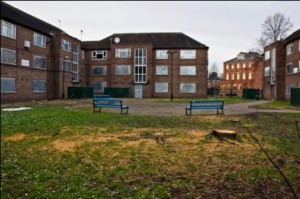Video: study reveals staggering “hidden cost” of squatting ban
Article published: Tuesday, March 27th 2012
Plans to criminalise squatting through the government’s Legal Aid Bill could cost up to £790 million, according to new research commissioned by the campaign group Squatters’ Action for Secure Homes (SQUASH).
 The study reveals how the “hidden cost” to the courts, police and welfare services of a ban could amount to between £316 million and £790 million over the next five years. Debated today for the final time in the House of Lords, current proposals under Clause 136 of the Legal Aid Bill would make squatting in disused residential properties a criminal offence in England and Wales
The study reveals how the “hidden cost” to the courts, police and welfare services of a ban could amount to between £316 million and £790 million over the next five years. Debated today for the final time in the House of Lords, current proposals under Clause 136 of the Legal Aid Bill would make squatting in disused residential properties a criminal offence in England and Wales
The study’s figures, calculated by including anticipated costs to housing benefit and homelessness duties which were ignored by government estimates, far exceed the official financial impact assessment of £25 million in costs over the next five years. The government hopes costs caused by the bill will be paid for by the £350 million in expected savings through other provisions including the slashing of legal aid.
Writing in the Guardian, housing minister Grant Schapps defended the ban, saying “we want to protect the rights of regular hard-working homeowners against the damage squatters can inflict on their homes, and the distress this causes in their lives.” Legal experts and the police have contradicted the minister’s claims however, pointing out that existing laws already protect the right of homeowners not to be forced from their homes.
Last September over 160 leading legal experts signed a letter denouncing the government’s “misleading statements” on the issue, and in their response to the Ministry of Justice’s consultation on the ban the Metropolitan Police were reported as arguing the law was “broadly in the right place” to tackle cases where people’s homes would be occupied.
Criticising the Bill, prominent housing solicitor Giles Peaker argued the changes are “being counted as protecting homeowners but actually what it’s protecting is people who are leaving property empty”, adding that “the whole thing would make virtually no difference to homeowners whatsoever.”
An estimated 40 per cent of homeless people have used squatting as an alternative to rough sleeping, and the proposed criminalisation has attracted widespread opposition from legal experts, homelessness charities and housing academics who have denounced the proposals for exacerbating a housing crisis at a time of severe cuts and mounting poverty. Nationally there are 720,000 homes standing empty across the country while homelessness has risen 14 per cent over the last twelve months.
In Manchester alone over 8,000 properties lie empty as reported by the Manchester Evening News, while almost 22,500 households sit on the council’s social housing waiting list. Government attempts to bring homes back into action remain slight, with a recent Homes and Communities Agency initiative granting £5 million to renovate just 460 out of the 25,000 disused homes in Greater Manchester.
Speaking to MULE, Robert Taylor of Manchester’s temporary squatted social centre the OK Café argued that “the proposed laws have nothing to do with protecting homeowners and are all about looking after big property speculators. The Law Society has stated that there already exists sufficient legislation to protect homeowners”.
Taylor added: “The government has whipped up the media into a frenzy of myths about squatters moving in whilst people have popped to the shops. The proposed new laws will directly criminalise homeless people who take shelter in empty buildings while also affecting cultural and community projects like the OK Café. It’s the same old Tories looking after their rich friends.”
Richard Goulding
Comments
-
[…] other government departments, and not by private individuals.” Housing solicitor Giles Peaker commented on the proposed laws, “The whole thing would make virtually no difference to homeowners […]
Pingback by » Reclaiming whose city? - MULE on April 11, 2012 at 6:23 pm
The comments are closed.



